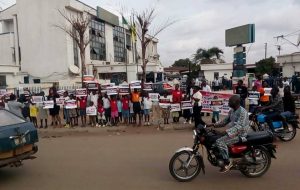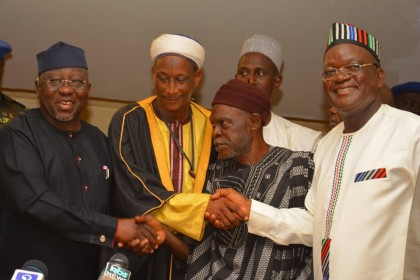Agatu Peace Process Risks a Violent Turn

The fear of armed peace as a key unspoken issue in the conflict. It’s not clear what the items are but are parts of seizure by the military in the restricted raid following the killing of a soldier during the first anniversary funeral February 8th, 2017
Agatu, the communal site of herdsmen violence in Benue State of Nigeria in February 2016 is not boiling now but witnessing a flurry of activities within the on-going peace process which may carry the seeds of an explosion in the near future. The first anniversary of the attack has brought back sentiments, fear and tension that a mistake here or there could trigger into something nasty if care is not taken. Agatu which has, for now, escaped full scale military invasion in respect of the killing of a soldier on February 4th, 1017 during the one year anniversary of the attack is, however, confronted by three other recent developments. The three key issues fuelling the suspicion and space of insecurity are the interpretation and misinterpretation of the decision of the governors of Benue and Nasarawa states regarding the return of herdsmen to Agatu, particularly the Adapati Island which has a certain grass type that is said to be irresistible to cattles; the on-going actual return of herdsmen to the area and a planned disarming exercise in the area.
All attempts to speak with Mike Inalegwu, the Sole Administrator of Agatu Local Government Council in Benue State yesterday, (Friday, February 24th, 2014) failed but he had been quoted in several other newspapers clarifying the return of Fulani herdsmen to the place. According to him, the decision of the governors permitted only unarmed herdsmen to the area, not foreign ones unknown to the people. It seems, however, that there is a parallel understanding of the issue. While the official line emphasises unarmed and known herdsmen as those covered by the decision of the governors within the framework of the peace process, the rest of the community are operating on a different interpretative wavelength.

‘Silence’ on compensation over destruction last year such as in this picture is an unspoken grudge
For the community and the youths, the mood in the area makes no distinction between armed and unarmed herdsmen or known and unknown ones. And the fear is that the only thing preventing violence again is the current activity of soldiers in turning away herdsmen trying to return to the place. Intervention was told that soldiers were actively turning them back as at Thursday this week. Although this could not be independently cross checked from a source different from the interested voice giving the information, it suggests that the military detachment in Agatu is reading the situation carefully and watching with eagle eye. The claim is that the mood of the people cannot take back herdsmen now without their presence triggering violence, notwithstanding the pledge of committment to peace by Fulani leaders. “They have been in Nasarawa since they left here last year. Why can’t they remain there for now? Let them stay away first” seems to be the aggregate view. Why the peace process failed to capture and reflect this broader sensitivity seems to be the puzzle about the decision of the governors now.

Benue and Nasarawa state governors, Samuel Ortom and Tanko Almakura respectively: the leading actors in the peace process

Artistic dimension of the peace efforts last year
Why the two governors took the decision without apparently considering the plausible reaction from the community is what Intervention could not ascertain. The available hint is that the governors might have been dealing with a security assessment of the whole conflict. How might any assessment of the situation be unaware that Agatu has gone beyond the physical Agatu and become evidence all manner of claimants are using to prove perceived this and that agenda, perceived Islamisation as well as perceived take over of land is, again, the puzzle. The mixture of all these claims with memories of last year’s violence has created fear, tension and a sense of resistance. Informed observers are, therefore, cautioning against any policy line other than leaving Agatu alone for now.

Representing the children as victims
Intervention’s investigation shows that there are many things in the minds of the Agatu people that have not been captured or drawn into the peace process. Speaking to certain players in the process, one senses a deep feeling of hurt that no one has mentioned compensation in the peace process. “We are here in our place. We were attacked. No student wrote NECO from this place that year and nobody mentions compensation for all the people killed and property destroyed?” There is a sense in which this feeling was somehow reflected in the communiqué of the last segment of the peace process where it was stated that the governors of Benue and Nasarawa states would make a case to the Federal Government, donor agencies, development partners, voluntary organizations and philanthropists to assist victims of the crisis in the affected communities of Benue and Nasarawa States. Some of the activists in the NGO coalition articulating Agatu cause in the process are, however, already making a joke of the paragraph, by drawing a comparison between it and what they said the British did to Zimbabwe during the negotiation of that country’s independence in 1980. They simply do not believe any money would come or would come when those who suffered the crisis are still alive.

‘Colonel, what’s going on here?’ appears to be what Senator David Mark is asking when he went to Agatu last year.
Although there are no harsh words against the military so far, the fear is how the planned disarming process could escalate. Part of the muted bitterness in Agatu is that an earlier disarming process by the Benue State government made them sitting ducks for herdsmen during the February 2016 attack. That too is part of the feeling of underdog feeding resistance. The idea of a soldier being killed during the one year anniversary of the Agatu violence sends an ominous signal to some observers who recollect that it was at a similar funeral that the first clash between police and Boko Haram occurred in Borno State, eventually triggering the Boko Haram insurgency.
Critics are asking whether the Federal Government is reading Agatu in its global and contemporary context. The claim in that regard is that the next phase of crisis in the world would be climate change induced conflict over land and water rights. Land is a fixed asset while the population is increasing. In the Nigerian context, we have no capacity of augmenting our land resources by scientifically increasing the quality of land. People live on land and they will die fighting to protect it. In Nigeria too, population increase and an unorganised approach to development have escalated demand for land, water and food. It is now such that anything involving these three can warrant a ‘do or die’ fight.

Chief Audu Ogbeh, Minister of Agriculture and Rural Development
Against this background, many people cannot understand why it seems so difficult to task the Lower Benue River Basin Development Authority along with the Federal University of Agriculture in nearby Makurdi with taking development to Agatu, especially replicating the Agatu grassland in a ‘No Man’ land since Agatu has become a battleground. What might be so difficult in doing so? Finance?
The picture emerging from and about Agatu is that perceptions have taken over and since perception is more powerful than reality, careful and cautious handling is called for considering the overall tension in the country and the restiveness of the youths generally. Adding Agatu to two volatile crises in Kaduna alone is something that should be avoided. There is sufficient early warning as well as indicators of the potential triggers in the case of Agatu and there is no reason for failing to transform the conflict through confidence building, development and communication.




























